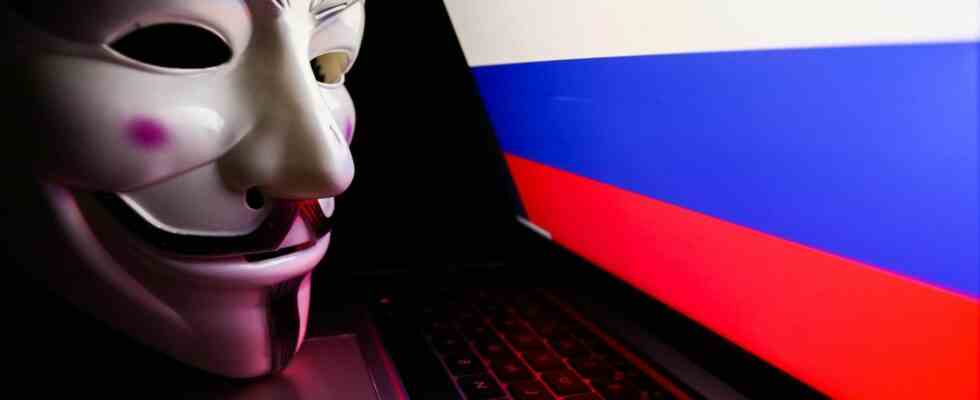Ukraine war
Anonymous hacks authorities, TV stations and sends SMS: This is how the hackers fight against Russia
Anonymous continues to fight on the digital front: The hackers recently captured data from the Russian regulatory, supervisory and censorship authority Roskomnadzor.
© Jakub Porzycki / Picture Alliance
More than 360,000 secret documents captured directly from the Russian authority Roskomnadzor. And that’s just a small part of the measures that the hacker collective Anonymous is using against Russia. That’s how much the hackers disturb the Russian media.
The international hacker collective Anonymous has struck again: 820 gigabytes of data are said to come from the Russian regulatory, supervisory and censorship authority Roskomnadzor, which the hackers of the Wikileaks alternative Distributed Denial of Secrets leaked. The platform offers the data found in its entirety. It is said to contain data from Russia’s most populous republic of Bashkortostan, such as e-mails, staff databases and legal research documents.
The site urgently warns interested parties not to open any data from the fund without first checking it. In particular, the mass of e-mail attachments could contain dangerous software. The platform warns that caution should also be exercised when interpreting the information contained in the documents. Since it is from data from a country at war, manipulated information can be expected.
Anonymous attacks non-stop
The Roskomnadzor hack is just one result of numerous attacks carried out on Russia by international, decentralized hackers. Since the start of Russia’s attack on Ukraine, Anonymous has tried in countless ways to disrupt Russia’s IT infrastructure, steal data and – perhaps as the most important building block – inform the Russian population about the course of the war in Ukraine, despite countless blocks of free sources of information.
On February 26, the hackers reported that they had taken over Russian television and were broadcasting pictures from Ukraine on the transmission frequencies of Russian state channels. The activists have also disrupted shortwave radio, and Russian websites keep going offline, mostly those with a connection to the Kremlin.
Previous hacks and promotions
An overview of some events from the past few weeks and days shows how versatile the collective attacks Russian websites and media or uses them for its own purposes. Below:
- A service called 1920.in was established. It makes it possible to send a message critical of Putin via SMS to random Russian mobile phone numbers, and a corresponding Whatsapp service is in the works.
- The Russian websites efondbiz.ru, julafree.ru and zabara-sergei.ru were taken over
- A database of the Russian energy company Gazprom was stolen and made public
- The Russian government website gov.ru is under heavy load and data has been siphoned from the server
- Russian steelmaker OMK has been hacked
- At times, the website of the Russian prison authorities showed counter-propaganda
- Data of users of the Russian search engine Yandex was leaked
- Russian streaming services Wink and Ivi have been hacked
- Websites of Sberbank and Moscow Stock Exchange constantly crash under heavy loads
- The radio frequency of Russian bombers was jammed
But where will that lead? Chaos Computer Club member Manuel Atug explained this star, he thinks “these offensive actions and leaks are only partially helpful.” Last week he spoke out against the attacks against Russia and said that “you can’t just cyber-pub Putin away,” but that the cyber-attacks against the Russian state may even put you in danger.
+++ Also read: “Putin cannot simply be cybered away” – Why a hacker considers the Anonymous attacks to be dangerous +++
Russia hedges and throws out
In fact, the attacks have so far not significantly disrupted the invasion of Ukraine, even if some of the actions are aimed directly at Russian military units. In order to avoid interference on the part of the government, the Digital Ministry ordered all Russian government websites to be freed from third-party elements within a few days and the pages to be migrated to Russian servers. Apparently you want to make yourself less vulnerable.
+++ Read also: With the decoupled “Runet” Russia could become digital North Korea – the preparations have been going on for years +++
As a last resort, Russia could even withdraw completely from the international Internet community – a corresponding bill has existed for years. At the moment, however, the Kremlin is apparently still content with blocking Western Internet services: Facebook, YouTube and Twitter are already blocked after Facebook allowed calls for violence against Putin (read more here), Instagram and Whatsapp are also on the brink of extinction in Russia.
swell: DDoSecrets, Twitter [1], Twitter [2], Twitter [3], Twitter [4]


